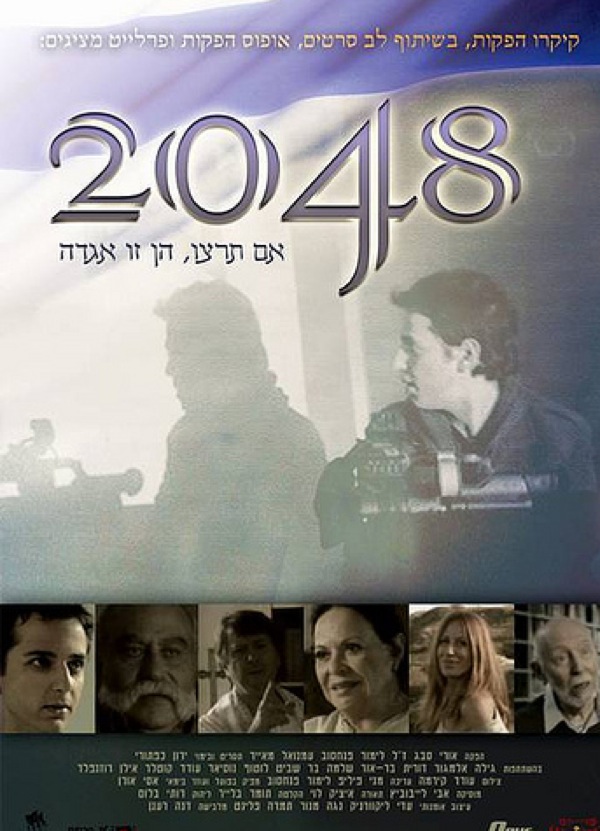An Israeli director has made a film that imagines a near future in which Israel has ceased to exist, fading into history. Yaron Kaftori’s “2048” was screened at the Tel Aviv Cinematheque last summer on Tisha b’Av – the date on which observant Jews mourn the destruction of the first and second temples, which preceded the dispersion of the Jewish people into exile. In the year 2048, a young cinematographer travels the world, interviewing Israelis in exile, trying to understand what happened to his grandfather’s country.
The date of the Tel Aviv screening was not coincidental. As Kaftori explains, in this Hebrew-language interview that was screened on Channel 2’s evening news broadcast, the circumstances that led to the first and second exiles of the Jewish people seem startlingly similar to the state of contemporary Israeli society. “How can we not notice this?” wonders the director.
Kaftori is the grandson of one of the founders of Kibbutz Mizra, which is famous in Israel for producing high-quality pork products like smoked ham, bacon and salami. The kibbutz restaurant, which specializes in bacon and egg breakfasts, is popular with Jewish families on Saturdays. But for Kaftori, who is described by the Channel 2 narrator as “salt of the earth: a kibbutz veteran and army officer who served in an elite unit,” Mizra represents a different type of Jewish religion – the religion of secular, social-democratic Zionism – a society that is strong because it values the collective over the individual. In the clip the director speaks about his grandfather, Shmuel, an idealistic pioneer who worked the land, paved a road and helped found a kibbutz.
Kaftori mournfully enumerates the many contemporary issues that illustrate Israel’s decline – the religious-secular divide, the way the state treats foreign workers, the government corruption, the materialism, the drunk driving, the organized crime, the insouciant attitude to petty corruption in everyday life.
The issue Kaftori does not mention is the occupation. This is a rather fascinating oversight, given that the occupation is the one issue that affects every single aspect of Israeli life, society and culture. It would be interesting to ask the director why he neglects to mention it as one of the factors leading to the third exile of the Jewish people in 2048.
Below is my translation of the film synopsis, taken from its website*, followed by the trailer with English subtitles. Click here to view a longer trailer, without subtitles. The film stars some major Israeli actors, including Gila Almagor, the grande dame of Israeli cinema and theater.
The year is 2048. Following the death of his grandfather, Yoju Netzer, a young cinematographer, sets out to complete the documentary film his grandfather began 40 years earlier.
The film “2048” is about Israel in its centennial year. But in the year 2048, the Israel we know does not exist anymore. The Israeli government has collapsed and the Jewish residents of Israel are scattered around the world. The reason for the collapse is never explained clearly; nor is it the most important part of the film. Instead, it is hinted at in ways that lead the viewer to draw his own conclusions.
The film develops in two different structures. The first, the dramatic-documentary structure, in which the contemporary protagonist of the film (2048), Yoju, watches documentary excerpts that his grandfather filmed during the 1960s in Israel (most of the documentary clips are from actual news footage that was filmed throughout 2008, Israel’s sixtieth year).
The second is a fictional documentary structure, in which Yoju interviews protagonists that experienced the collapse of the State of Israel and, with the perspective of hindsight, tell Yoju about his grandfather, as well as what happened during the years that disappeared into history.
Note that in Kaftori’s imagined future, the archive of the defunct state of Israel is now located in a Berlin library, presided over by an historian who speaks Yiddish in addition to his native Hebrew and adopted German. Also interesting is that Kaftori’s Israel is very Ashkenazi, with Yiddish mentioned as a Jewish language but Ladino ignored; and with the kibbutz, which is the ultimate Ashkenazi institution, held up as the ideal manifestation of the state. The Hebrew trailer also features an Arab character who, in the year 2048, lives in the land that was once Israel, where he owns a shop – Nasser’s Souvenirs – that deals in Israeli and Zionist memorabilia. The ultimate Jewish-Israeli nightmare has become reality: Israel has fallen into the hands of “the Arabs.”
[youtube]http://www.youtube.com/watch?v=kTMqA-hJrSc[/youtube]
*Click here to read a bit more about the film in English, and to purchase a DVD of 2048.


